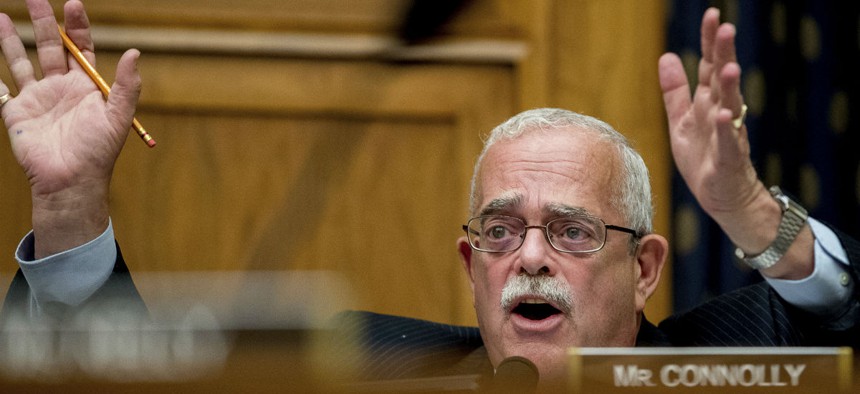Officials Laud House Proposal for Commission to Curb Improper Payments
Plan to reduce waste and fraud draws bipartisanship.
Buried in the far-reaching House budget resolution that cleared committee on Wednesday is a proposal to empanel an “independent commission to find tangible solutions to reduce governmentwide improper payments.”
Reaching higher than the Trump administration’s fiscal 2018 budget, the House Republican plan sets the goal of cutting unmerited payments in such programs as Medicare and the Earned Income Tax Credit by 50 percent within the next five years, rather than Trump’s 10. “It would also be required to develop a tighter system of agency oversight to ensure agencies comply with commission recommendations and achieve the reduction goal over time,” the resolution said.
The current governmentwide estimate of improper payments stood at $144 billion for fiscal 2016, according to the Government Accountability Office, and the Republican plan aims to trim it by a cumulative $700 billion between now and 2023.
That vision was music to the ears of several officials and industry specialists who attended a Thursday forum with the American Council for Technology-Industry Advisory Council. Many of them have been involved in agency struggles to vet outgoing payments using data analytics as required under three major laws targeting improper payments and more general waste and fraud.
The commission idea is “intriguing” to Dave Mader, the longtime Internal Revenue Service alumnus who until recently was U.S. comptroller before becoming chief strategy officer for Deloitte Consulting. “The issue is really not partisan, so if you get the relevant parties around a table, you could share data on how to bring agencies to capacity,” he told Government Executive.
Mader cited as a model the 1996 commission on restructuring the IRS led by Sen. Bob Kerrey, D-Neb., and Rep. (now Sen.) Rob Portman, R-Ohio. “Now we have forces in the executive branch and a president who realize that only by having the federal community come together can we solve the improper payments problem.”
A commission, Mader said, could help break some of the logjams in getting federal agencies as well as states to share data that can prevent wrongful payments in such programs as food stamps, unemployment insurance and block grants.
“Congress needs to step up and do their job,” Mader told the forum, in enacting laws that advance long-discussed “program integrity proposals” that could help agencies prevent improper payments from occurring in the first place rather than tackling them late with “pay and chase.” The example he recommended is easing the current restriction in the Social Security Act that prevents the Treasury Department’s Fiscal Bureau from readily accessing the Death Master File for privacy reasons. (Treasury, as represented at the forum by Jeff Schramek, assistant commissioner for debt services management, is a key player in the improper payment campaign, using its databases to vet 87 percent of all payments by 200 federal agencies—1.8 billion a year, totaling $3.3 trillion in 2016.)
Mader’s enthusiasm for seizing the moment for bipartisanship was echoed by panel moderator Mark Reger, the current deputy controller at the Office of Management and Budget, who has been working on program integrity efforts in both the Obama and Trump administrations. (He mentioned that a revised circular A-123 on internal controls and risk management in payments is due this month.)
Rep. Gerry Connolly, D-Va., whose keynote talk at the forum linked the need to curb improper payments to restoring faith in government, agreed that the House plan to halve the bad-payment rate “is not an impossible goal.” The number $700 billion “looks like a plug-in number, and we have a very unstable government right now with so many vacancies” in technology leadership jobs, he said to reporters after his speech.
But progress will be made only “if Congress invests in the enterprise, to upgrade hiring skills,” which, he noted, are not a high priority in the Trump budget. “I have yet to meet the citizen who sees nothing wrong with improper payments,” Connolly said. He contrasted poll numbers of faith in government during the Kennedy administration, in the 70th percentile, with the current figure, 17 percent. “Democracy is at risk when only 17 percent have faith,” he said, adding that the symbolism of the $144 billion estimate is more important than the actual amount. That figure amounts to $1.4 trillion over 10 years, he said, which is “roughly sequestration. If we could get it to zero, we wouldn’t have to cut anything or raise taxes."
Though Congress and agencies have made progress in incentivizing staff to catch improper payments and by funding updates of information technology, Connolly said “we still spend “$96 billion in IT procurement, for which half is legacy technology,” some from the Johnson administration. “Technology is what catches the payment errors up front,” he said, “and we need to invest in enterprise technology—we’re way behind the private sector.”
People who cheat the IRS out of improper earned income tax credit refunds are seldom caught or prosecuted, he said, naming an agency known for ancient computer systems. “That’s why the urgency of technology is so important.”
Investing more money in agencies is also a priority for Mader, who told Government Executive that Budget Director Mick Mulvaney had made a “compelling argument” that OMB deserves more funding in the fiscal 2018 budget. Of OMB’s 500 employees, “only three people are working on the $144 billion improper payments problem” at the same time they’re doing budget cutting and reorganization, he said. OMB, along with GAO, does “the best analytical work in town,” and they don’t have funds to hire consultants. A few more employees at OMB, Mader said, could be hired for just a few years.




